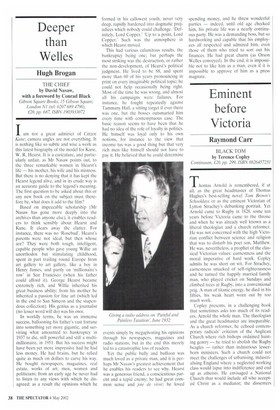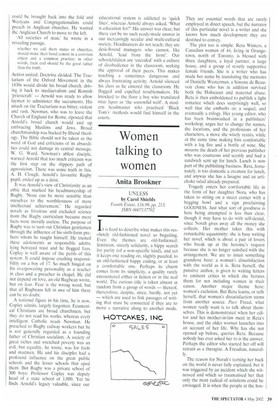Eminent before Victoria
Raymond Carr
BLACK TOM by Terence Copley
Continuum, £20, pp. 299. ISBN 0826457231
Thomas Arnold is remembered, if at all, as the great headmaster of Thomas Hughes's best-selling novel Tom Brown's Schooldays or as the eminent Victorian of Lytton Strachey's debunking portrait. Yet Arnold came to Rugby in 1828, some ten years before Victoria came to the throne and when he was already well known as a liberal theologian and a church reformer. He was not concerned with the high Victorian conflict between science and religion that was to disturb his poet son, Matthew. He was, nevertheless, a prophet of the classical Victorian values: earnestness and the moral imperative of hard work. Copley admits he was short on wit. For Strachey, earnestness smacked of self-righteousness and he turned the happily married family man, who played cricket on Sundays and climbed trees at Rugby, into a conventional prig. A man of titanic energy. he died in his fifties, his weak heart worn out by too much work.
Copley presents, in a challenging book that sometimes asks too much of its readers, Arnold the whole man. The theologian and the great headmaster are inseparable. As a church reformer, he echoed contemporary radicals' criticism of the Anglican Church where rich bishops ordained hunting gentry — he tried to abolish the Rugby beagles — rather than industrious lesserborn ministers. Such a church could not meet the challenges of urbanising, industrialising England where a neglected working class would lapse into indifference and end up as atheists. He envisaged a National Church that would include all who accepted Christ as a mediator; the dissenters could be brought back into the fold and Weslyans and Congregationalists could preach in Anglican churches. He wanted the Anglican Church to move to the left.
'All societies of man,' he wrote in a revealing passage,
whether we call them states or churches, should make their bond consist in a common object and a common practice; in other words, their end should he the good rather than the truth.
Action united. Doctrine divided. The Tractarians of the Oxford Movement in the 1830s would divide his broad church, driving it back to mediaevalism and Romish `priestcraff — Arnold was ready to allow laymen to administer the sacraments, His attack on the Tractarians was bitter, violent and rash. Newman, who was to leave the Church of England for Rome, riposted that Arnold's broad church would end up embracing Muslims and Jews. Broad churchmanship was backed by liberal theology. The Bible should not be taken as the word of God and criticisms of its absurdities could not damage its central message. W. G. Ward. Newman's ablest disciple, warned Arnold that too much criticism was the first step on the slippery path of agnosticism. There was some truth in this. A. H. Gough, Arnold's favourite Rugby pupil, ended up as a deist.
It was Arnold's view of Christianity as an ethic that marked his headmastership of Rugby. 'None can be more sensible than ourselves to the worthlessness of mere intellectual achievement.' He regarded novels as frivolous and excluded science from the Rugby curriculum because mere facts were morally useless. The purpose of Rugby was to turn out Christian gentlemen through the influence of his sixth-form prefects whom he taught himself. He trusted these adolescents as responsible adults; lying betrayed trust and he flogged liars. Copley is well aware of the perils of this system. It could impose crushing responsibility on a boy of 17. So much hinged on his overpowering personality as a teacher in class and a preacher in chapel. He did not depend on love, an old Rugbean wrote, but on fear. Fear is the wrong word, but that all Rugbeans felt in awe of him there can be no doubt.
A national figure in his time, he is now, Copley admits, largely forgotten. Ecumenical Christians are broad churchmen, but they do not read his works, whereas every intelligent Catholic reads Newman. He preached to Rugby railway workers but he is not generally regarded as a founding father of Christian socialism. A society of great riches and wretched poverty was an evil, but equality, he wrote, was for fools and madmen. He and his disciples had a profound influence on the great public schools and the lesser schools that aped them. But Rugby was a private school of 300 boys: Professor Copley was deputy head of a state school of 1,000. Yet he finds Arnold's legacy valuable, since our educational system is addicted to 'quick fixes', whereas Arnold always asked, 'What is education for?' His answer was clear, but there can be no such ready-made answer in our increasingly secular and multi-cultural society. Headmasters do not teach; they are desk-bound managers who cannot, like Arnold, 'lead from the front'. Our schoolchildren are 'encoded' with a culture of disobedience in the classroom, seeking the approval of their peers. This makes teaching a sometimes dangerous and always frustrating activity. Arnold silenced his class as he entered the classroom. He flogged and expelled troublemakers. He knocked to the floor a boy who translated triste lupres as the sorrowful wolf'. A modern headmaster who practised 'Black Tom's' methods would find himself in the courts.







































































 Previous page
Previous page